The Burrow

Professional athletes are constantly pushing their bodies to the limit. While training regimes and exercise are vital for developing athletic ability, proper diet and nutrition are essential for optimal performance. Not only does proper nutrition provide fuel for training and competing, it also helps with strength and recovery, while ensuring they maintain the required levels of energy availability to avoid negative impacts on physiological well-being and competitiveness.1
The importance of a well-balanced diet cannot be understated. If you are looking to maintain a healthy diet, it may be worthwhile knowing that health insurance can support your journey by providing cover for things such as dietetics and for some diet-related illnesses, depending on your level of cover.
As health insurance experts, we want everyone to understand how best to fuel their bodies through a balanced diet and maintain healthy habits. That’s why we’ve investigated the diets of different professional athletes to understand what fuels peak performance.
The unique movement and strength requirements of each sport will surely require different nutritional foundations to support it. To find out exactly how they differ, we’ve measured what athletes in various sports categories would typically eat to support their day-to-day routines.
We decided to look at pre-game meals and mid-game snacks, which help athletes replenish and sustain high energy levels throughout training and competitions.
Find out more in the full methodology.
Click on the white button in each image below for more information on the average diet of each type of professional athlete.
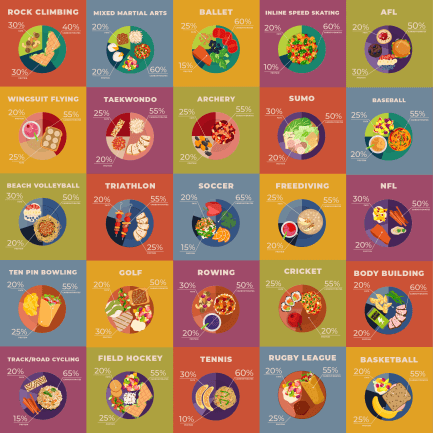

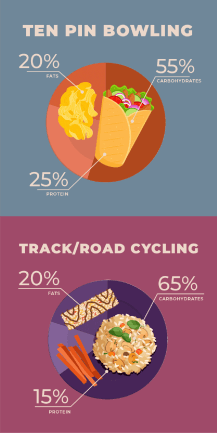

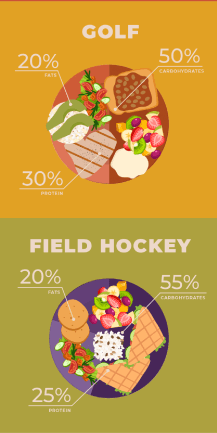

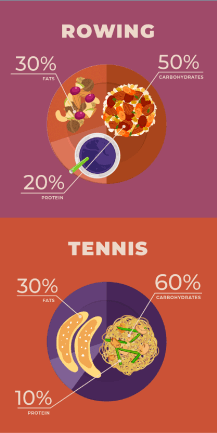

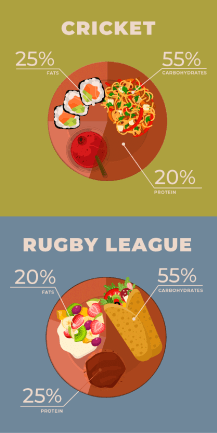

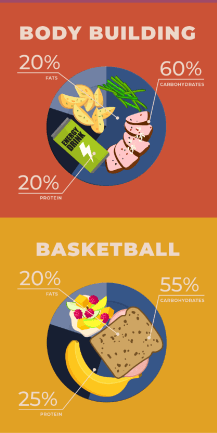
For this article, we’ve divided sports around the world into different categories, including:
We chose a sport per category depending on how popular or fascinating their diets are.
Athletes normally have diet plans tailored to their specific needs, which are recommended by professional dieticians, nutritionists, medical professionals or sports professionals. That’s to say, our list of what athletes from each sport category typically eat are generalised and aren’t recommendations by any means.
We’ve looked at meals that athletes would typically eat to before training for each sport category. Pre-game meals are foods that provide athletes the nutrients to replenish and sustain energy levels throughout training and competitions. We also took note of any snacks they may eat during training or competitions, as this can provide vital energy replenishment for optimal performance.
For some of the sports, we chose the specific meals based on what our sources recommended. For other sports, we chose meals based on the macro requirements and guidelines recommended by our courses.
Note that individual nutrition requirements are determined by training load and goals, athlete needs, body composition, injuries and health, which can only be determined by a certified sports dietician. Everyone should eat according to their specific needs because there’s no ideal diet that’ll suit everyone.
1. Sports Dieticians Australia. (2020). Maximising Energy & Fighting Fatigue in your Athletes: Understand key symptoms, nutritional strategies and when to reach out for help! Retrieved from https://www.sportsdietitians.com.au/wp-content/uploads/2020/07/Maximising-Energy-Fighting-Fatigue.pdf. Accessed 27 July 2020.
2. Robert Portman. (2015). Nutrition: Eating Your Way to Better Climb. Retrieved from https://rockandice.com/rock-climbing-training/nutrition-eating-your-way-to-better-climbing/. Accessed 27 July 2020.
3. Elena Zinkov. (2016). Nutrition Essentials for Climbers. Retrieved from https://www.climbing.com/skills/nutrition-essentials-for-climbers/#:~:text=For%20multi%2Dpitch%20climbing%2C%20consume,%2C%20trail%20mix%2C%20and%20gels. Accessed 27 July 2020.
4. Mens Journal. The 15 Greatest Moments in Wingsuit History. Retrieved from https://www.mensjournal.com/adventure/the-15-greatest-moments-in-wingsuit-history-20150511/. Accessed 3 August 2020.
5. Australian Parachute Federation Incorporated. (2014). Wingsuit Training Guide. Retrieved from https://www.apf.com.au/ArticleDocuments/171/Wingsuit-Training-Guide-201409.pdf.aspx?Embed=Y. Accessed 3 August 2020.
6. Claire Turnball. (2014). Volleyball & Beach Volleyball: Eating for your Sport. Retrieved from https://www.nestle.co.nz/sites/g/files/pydnoa371/files/asset-library/documents/nutrition%20advice%20sheets/volleyball%20-%20manaia%20harris.pdf. Accessed 27 July 2020.
7. TopEnd Sports. Eating Guidelines for Bowling. Retrieved from https://www.topendsports.com/sport/tenpin/nutrition.htm. Accessed 3 August 2020.
8. Sports Dieticians Australia. Road Cycling. Retrieved from https://www.sportsdietitians.com.au/factsheets/food-for-your-sport/food-for-your-sport-road-cycling/. Accessed 28 July 2020.
9. The Australian Ballet. Everything you always wanted to know about ballet: BALLET FAQs. Retrieved from https://australianballet.com.au/ballet-101/ballet-faq. Accessed 29 July 2020.
10. North Melbourne Football Club, AFL: The running game. Retrieved from https://www.nmfc.com.au/news/773180/afl-the-running-game. Accessed 14 March 2022.
11. Sports Dieticians Australia, AFL. Retrieved from https://www.sportsdietitians.com.au/factsheets/food-for-your-sport/food-for-your-sport-afl/. Accessed 14 March 2022.
12. Sports Diet Australia. Soccer. Retrieved from https://www.sportsdietitians.com.au/factsheets/food-for-your-sport/food-for-your-sport-soccer/. Accessed 29 July 2020.
13. AusDance. (2012). Fuelling the Dancer. Retrieved from https://ausdance.org.au/articles/details/fuelling-the-dancer#:~:text=A%20dancer’s%20diet%20should%20consist,be%20increased%20to%20about%2065%25.. Accessed 29 July 2020.
14. CSPDA. (2014). Nutrition for the soccer student-athlete. Retrieved from https://www.sportsrd.org/wp-content/uploads/2018/11/Nutrition_for_Soccer_Student-Athletes_web_version.pdf. Accessed 30 July 2020.
15. Sports Dieticians. Golf. Retrieved from https://www.sportsdietitians.com.au/factsheets/food-for-your-sport/food-for-your-sport-golf/. Accessed 30 July 2020.
16. Sports Dieticians. Hockey. Retrieved from https://www.sportsdietitians.com.au/factsheets/food-for-your-sport/food-for-your-sport-hockey/#:~:text=A%20hockey%20player’s%20diet%20should,along%20with%20some%20healthy%20fats.. Accessed 30 July 2020.
17. Waikoto Hockey Association (Inc). (2007). Retrieved from https://www.sporty.co.nz/asset/downloadasset?id=cf0e0b71-49ee-452e-af62-957487ea7c0b. Accessed 30 July 2020.
18. Elite-MMA. What is MMA? Retrieved from https://www.elite-mma.com/what-is-mma. Accessed 30 July 2020.
19. Britannica. Mixed Martial Arts. Retrieved from https://www.britannica.com/sports/mixed-martial-arts. Accessed 30 July 2020.
20. Sports Dieticians. Taekwondo. Retrieved from https://www.sportsdietitians.com.au/factsheets/food-for-your-sport/food-for-your-sport-taekwondo/. Accessed 30 July 2020.
21. Sports Dieticians. Triathlon: Long Course. Retrieved from https://www.sportsdietitians.com.au/factsheets/food-for-your-sport/triathlon/. Accessed 30 July 2020.
22. Sports Dieticians. Rowing. Retrieved from https://www.sportsdietitians.com.au/factsheets/food-for-your-sport/rowing/. Accessed 30 July 2020.
23. Rowing New Zealand. Nutrition Manual for Age Group Rowers. Retrieved from https://www.sporty.co.nz/asset/downloadasset?id=48a2ca54-dce6-47a2-8e4b-3e853e4cb6cb. Accessed 30 July 2020.
24. Sports Dieticians. Tennis. Retrieved from https://www.sportsdietitians.com.au/factsheets/food-for-your-sport/food-for-your-sport-tennis/. Accessed 31 July 2020.
25. Yasmin Mehta. Nutrition and Stretching. Retrieved from http://speedskatetraining.com/wp/what-to-eat-and-when/. Accessed 3 August 2020.
26. Yuchun Huang. (2015). Research on Speed Skaters’ Rational Nutrition based on Scientific Training. Retrieved from https://pdfs.semanticscholar.org/b827/705b79bb4d7d609a08dac7fc8f783ba51b31.pdf. Accessed 3 August 2020.
27. Randy Ulmer. Holding Steady: Training Exercises for Improving Draw Strength. Retrieved from https://www.bowhuntingmag.com/editorial/holding-steady-training-exercises-for-improving-draw-strength/309332. Accessed 3 August 2020.
28. Emma Farrell. (2016). Diet for Freediving. Retrieved from https://www.deeperblue.com/diet-for-freediving/#:~:text=Think%20about%20your%20plate%20being,your%20body%20and%20your%20freediving.. Accessed 3 August 2020.
29. Paul Rodgers. (2020). What Is a Bodybuilding Diet? Retrieved from https://www.verywellfit.com/the-weight-trainers-bodybuilding-diet-3498427. Accessed 3 August 2020.
30. NRL, Season to date statistics. Retrieved from https://www.nrl.com/news/2021/05/20/season-to-date-statistics/. Accessed 14 March 2022.
31. Sports Dieticians Australia, Rugby League. Retrieved from https://www.sportsdietitians.com.au/factsheets/food-for-your-sport/food-for-your-sport-rugby-league/. Accessed 14 March 2022.
32. Sports Dietitians Australia, Cricket. Retrieved from https://www.sportsdietitians.com.au/factsheets/food-for-your-sport/food-for-your-sport-cricket/. Accessed 14 March 2022.
33. Gatorade Sports Science Institute: Fueling the basketball athlete: The practitioner’s approach. Retrieved from https://www.gssiweb.org/sports-science-exchange/article/sse-168-fueling-the-basketball-athlete-the-practitioners-approach. Accessed 14 March 2022.
34. American Dietetic Association. Fueling Baseball Players. Retrieved from https://healthpromotion.ucsd.edu/_files/topics/healthy-eating/sports-nutrition/baseball.pdf. Accessed 14 March 2022.
35. Heads Up. How Far Do Pro Athletes Run During Games?. Retrieved from https://headsup.scoutlife.org/far-pro-athletes-run-games/. Accessed 14 March 2022.
36. Gatorade Sports Science Institute: Fueling a football team. Retrieved from https://www.gssiweb.org/sports-science-exchange/article/sse-146-fueling-a-football-team. Accessed 14 March 2022.
If you’re an aspiring athlete, it’s important to have a team of professionals who can give you medical support so that you can perform at your best. Whether you need a physio, nutritionist, remedial massage therapist, or any other service, your private health cover may be able to cover some of the costs.
You can compare the different benefits through our Australian health insurance comparison tool in a convenient side-by-side view. It’s easy to find great value policies.